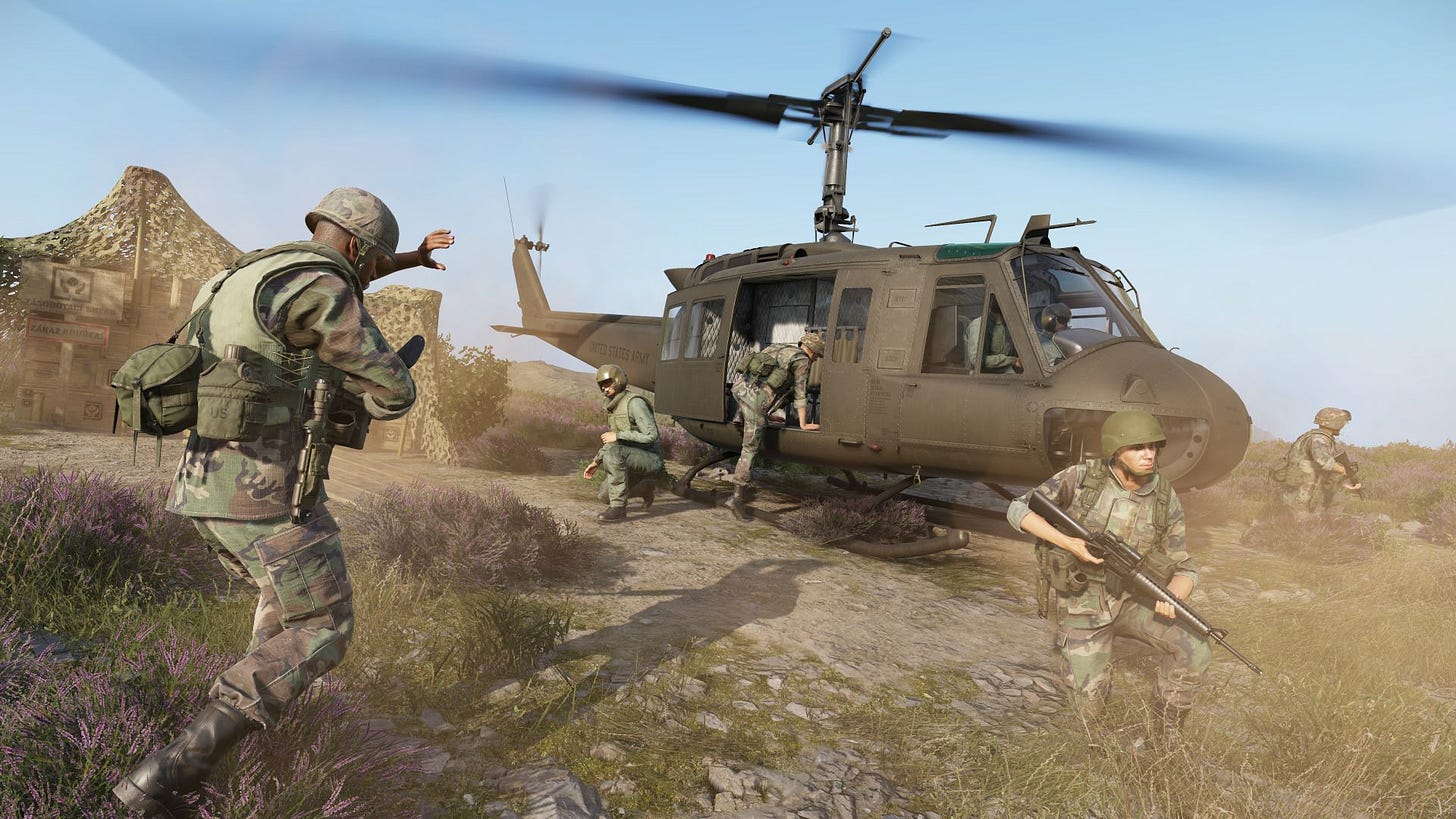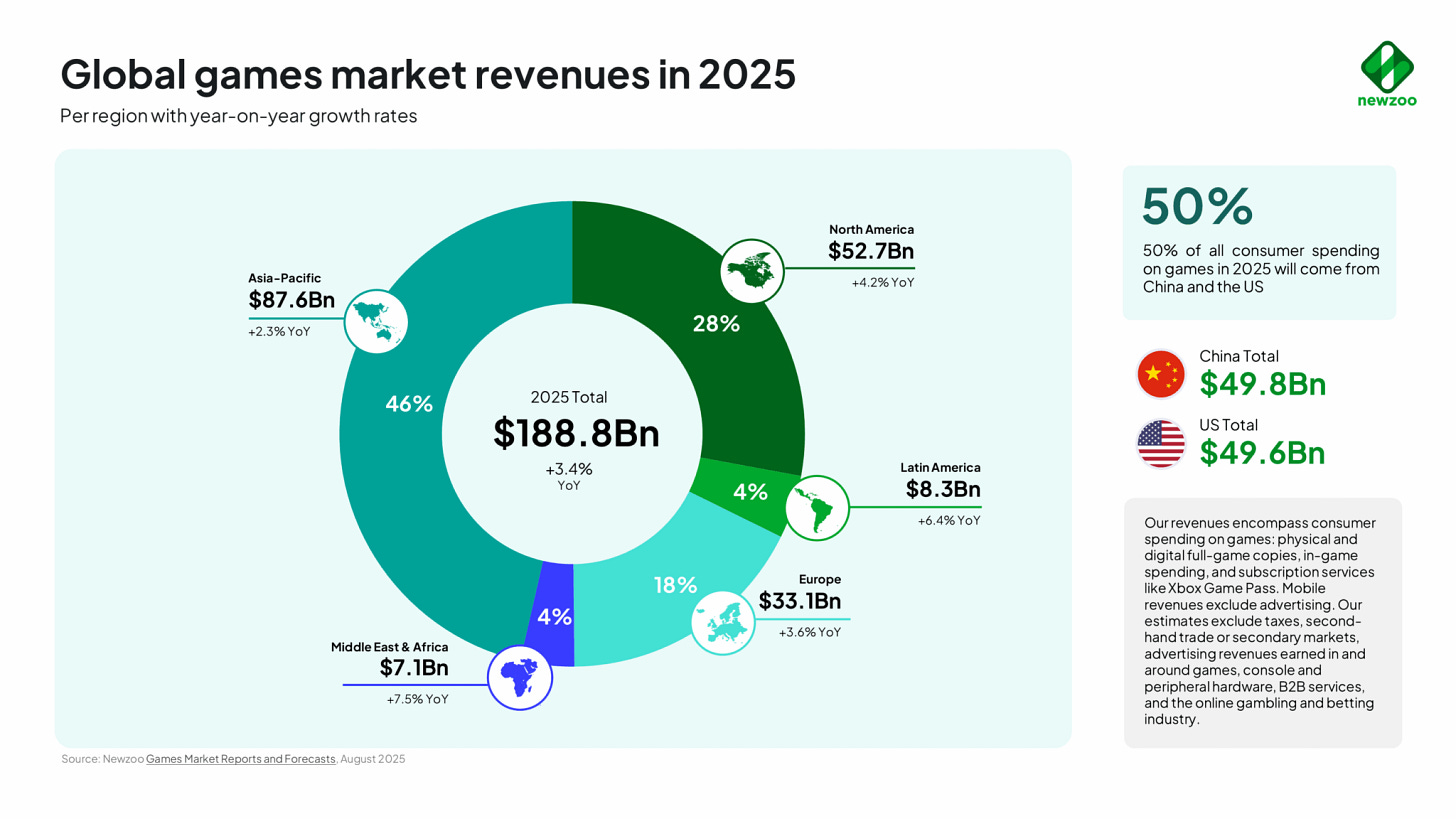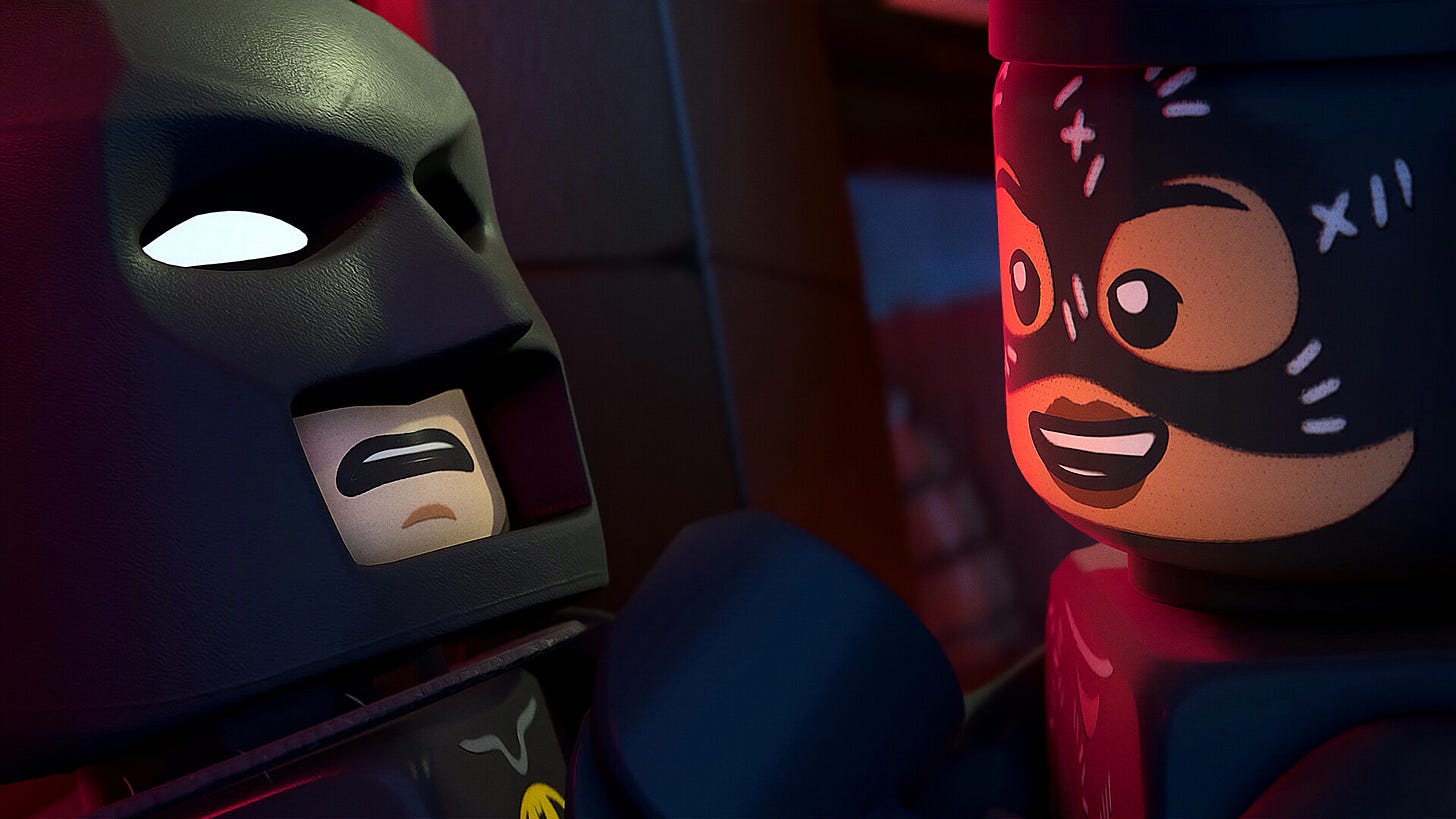ARMA at War, 11/09/2025
Bohemia Interactive talks disinformation, extremism, and battlefield simulation
This week’s Video Games Industry Memo is sponsored by Testronic.
Delivering QA & Localisation excellence to some of the world’s biggest games studios and publishers for over 25 years
ARMA’s role in war goes under the microscope in this week’s Big Read
Global games market to hit $189bn in 2025, says Newzoo
Lego Batman: Legacy of the Dark Knight gets a thumbs up in our game preview of the week
Hello VGIM-ers,
Tom Regan here, back in your inbox while Mr Osborn readies himself for two weeks off.
As a lifelong player of video games, I’ve long been quick to brush off the links between video game violence and the real world.
Yet where historical war games are largely just harmless pieces of entertainment, the uncomfortable truth is that contemporary military shooters have a far murkier relationship with real war.
Shortly after the advent of online gaming, 2002 saw the US military release a game called America’s Army, a hugely popular free-to-play online shooter that brazenly served as a military recruitment tool.
Since then, the world of video games has intersected with the real business of war in ways that have often proven uncomfortable.
The US army has continued to advertise in the gaming world, founding an esports team in 2018 to stream recruitment drives on Twitch - something that US Congresswoman Alexandra Ocasio-Cortez tried, and failed, to put a stop to.
Firearm manufacturer Remington, meanwhile, partnered with Activision Blizzard in 2009 to subtly promote its Adaptive Combat Rifle in Call of Duty 2: Modern Warfare - something that only came to light following a lawsuit in the wake of the Sandy Hook shooting in 2012.
And Russia is using video games to spread disinformation about the war in Ukraine, with tactical shooter Squad 22: ZOV encouraging players to liberate Mariupol and the Donbass in a game actively backed by Russia’s Ministry of Defence.
But if there’s one game that has seen the challenges of the blurring of war and games more closely than any other, it’s Bohemia Interactive’s ARMA.
The realistic military shooter is beloved by a dedicated fan base of war gamers across the world. However, its realism has increasingly put it at the centre of our digital frontlines: something that I sat down with the development team to discuss last week.

The big read - ARMA at War
Reality blurred: The problem with making a realistic simulation game is that you have to make it look and feel just like the thing it is representing. And the first way that ARMA has been popping up within warfare is in a context some VGIM readers will already be familiar with: the spread of misinformation and disinformation.
Unreality television: Thanks to ARMA’s realistic tech, videos made in the game have been passed off as real combat footage across social media. They’ve even looked convincing enough to make it onto news programmes like France 24 and Russia’s Channel One TV, which failed to spot the quirks of video game content footage. In an age of AI videos, bothering to recreate war footage with a video game engine feels almost quaint, yet for the team at Bohemia Interactive, it’s a concern they’ve dealt with for years.
Faking warfare: “Arma 2 was released in 2009 and with every major conflict in the real world, there’s [been a] wave of these fake news videos,” says Bohemia Interactive’s Global PR lead, Pavel Křižka “It was the case with Afghanistan and Syria and definitely now when there's a conflict between Ukraine and Russia. Fake footage for Arma 3 was supposed to show even a non-existent conflict between India and Pakistan. It’s obviously not good for our developers who spend 10 years creating the game…[seeing our]work misused in this way is heartbreaking.”
Reuting out the problem: After initially trying to get fake videos taken down from YouTube and social media platforms directly, Bohemia Interactive instead went to the media to teach them how to spot when videos of the game are being passed off as conflict footage.
Direct line of communication: “Over the years, we learned that the best way to combat this is to cooperate with actual media and factchecking organizations because they have much better reach and much better tools to detect these kinds of videos,” says Křižka,” We have a direct line of communication with Reuters, AFP, but also smaller fact checkers and particular media all across the world - and that's the best way to mitigate the problem.”
Extreme play
The MOD squad: Ok, but why exactly is ARMA at the heart of all of these videos rather than, say, Call of Duty? Well, a big reason for ARMA’s success is also something that makes it vulnerable to being misused: its extensive modding platform. ARMA’s remarkably open platform has spawned a variety of big-hitting mods that players love. This includes the zombie-stuffed DayZ mod, which used ARMA’s impressive tech to create the game that inspired the now hugely successful survival genre.
4chan, 4 chaos: Unfortunately, the game’s impressive tech has also been leveraged in less savoury ways. Beyond bad actors cutting ARMA game footage to misinform, as mentioned above, posters on 4chan used the game’s modding engine to recreate 2019’s horrific mosque massacre in Christchurch, New Zealand: a horrifying memorial to a crime framed to look like a video game livestream.
Sins of the father: But how responsible are game developers for the actions of their community and, particularly, the most toxic parts of it? While Bohemia has been proactive in working to stop ARMA footage from being used to spread misinformation, it takes a far more lax approach to those who mod more questionable things into their game, with Křižka telling me that there is an “element of self-regulation of the community”.
Education, education, moderation: “Our approach is more about education, “ says Křižka, “we don't want to be restrictive, because if we were restrictive, it would mean that we can’t have tens of thousands of mods.” He went on to say that taking down mods would remove a “signature feature of ARMA” and that the studio doesn’t want to take away the creative freedom of its users.
Extreme self-expression: It’s a battle that many developers face with games that rely on user-generated content, as well as a wider challenge for anyone who makes any form of expressive creative technology. However, there are currently live mods within the ARMA community which feature representation of extremist groups such as the Ku Klux Klan (KKK). Given that ISIS has used ARMA 3 mods within its recruitment drive, the stakes are somewhat higher when it comes to moderating its modding community than, say, Minecraft.
Do no ARM: In response to the concerns we raised, Bohemia Interactive said that it has been improving its moderation processes over the past decade. “We have been manually combing through 180,000+ units over the past 12 years. While it has, at times, proven overwhelming to moderate, in this time, we have removed over 20,000 ARMA 3 units manually. We are currently looking into creating automated solutions and implementing AI tools to clean up and maintain ARMA 3 units. Looking towards ARMA 4 [the next full release in the series], we will have stronger protections in place… we will also be expanding our team for dealing with bans related to mods, servers, and units going forward.”
A message from our sponsor Testronic: Boasting Centres of Excellence & Innovation in Europe, the US and South East Asia, Testronic is positioned to provide outstanding QA Testing & Localisation services to leading studios and publishers around the world.
Whether it’s providing expert support for flawless gameplay or gold standards in localisation, Testronic is a trusted partner for the biggest names in games.
Find out more at www.testroniclabs.com
Simulated war
Playground, or simulator?: Protecting the rights of ARMA’s 10 million-strong community to create mods in the face of extremist action is a challenging balancing act for the company. And that situation becomes even more complex, given that Bohemia Interactive’s ARMA engine has been spun off - and sold - for use by defence companies.
Entering the virtual battle space: In 2001, Bohemia Interactive created a military training-focused subsidiary company, Bohemia Interactive Simulations, to sell a modified version of ARMA’s predecessor as military training called Virtual Battle Space (VBS).
Flash Warring: “When Operation Flashpoint was released, there was this guy on the team who said, ‘Okay, we have super nice working physics models of weapons, why not change it towards more professional use?’” Křižka explains, “He pitched the idea to our CEO, Marek Španěl, who is still CEO, who said, Why not? So we set up a branch in Australia, and it was developed in a small shack near the sea, and it grew and grew.”
Guess who?: VBS quickly became popular amongst militaries across the world, who could both save money on developing their own simulation systems and ask for adaptations to the tool - such as relevant weather conditions for their warzones - to suit their needs. It has since become the “NATO military standard for combat training,” according to Křižka. This led to BAE Systems acquiring Bohemia Interactive Solutions for $200m in 2022, eventually resulting in the US Army signing a deal to use VBS4 to train its troops earlier this year.
Stating the point: Křižka was keen to stress that despite ARMA and VBS sharing the same heritage, they sit within different businesses. “Bohemia Interactive Solutions is not part of Bohemia Interactive anymore; it's owned by BAE,” he stated.
Forking hell: But because ARMA is so closely related to VBS, Křižka admitted that the still independent Bohemia Interactive has had to work hard to stop unsanctioned militaries, extremist groups, or terrorists from using the game for training purposes.
EULA hoops: “We are very strict about our end user license agreement and how our game can be used - and it's just for fun,” says Křižka. “We had cases when some militaries were using the game for training purposes, and obviously, then our legal team was involved because it's something that we are restricting completely."
An ethical stalemate
Under ARMA: But Bohemia Interactive’s approach to protecting ARMA shows how messy things get when the digital and physical frontlines blur.
Creative expression: On the one hand, recreating war and indulging in wargaming is a perfectly reasonable thing to do in a world where Band of Brothers, Inglorious Bastards, or Zero Dark Thirty shape the cultural conversation. Modding a game like ARMA to allow players to play out the war games they want to play, or create entirely new ones, is a peaceful and fun activity. Limiting freedom of expression in any form can cause problems.
All in moderation: On the other hand, the strictly legalese approach to policing the use of its software for training raises a concern that the company’s main fear about misuse is when Bohemia Interactive isn’t profiting from it somewhere. And with most of the harmful stuff coming out of the modding community, which ARMA only indirectly benefits from, the company will need to continue to be good to its word to strengthen policing of the space in the years ahead.
Digital frontlines: But with games a major part of our digital lives and, by extension, the entire modern world, the use and misuse of ARMA by militaries, extremists, and bad actors trying to shake things up shows that the border between physical and digital frontlines is narrow indeed. That’s something players, policy makers, and even the military will need to consider carefully in the years to come.
News in brief
Big numbers: Newzoo has whipped the covers off its latest global games market report and revealed that the industry is set to generate $189bn across the world this year. Overall market revenue is forecast to climb by 3.4% this year, in no small part due to the successful launch of the Nintendo Switch 2. However, mobile revenue growth is a little sluggish due to market saturation in the Eastern Asian Market. PC revenue, meanwhile, is being propped up by growing demand in China and Japan.
Esportswashing latest: The world’s biggest fighting game tournament, Evo, has been acquired by the Saudi Arabian city of Qiddiya. The move comes just weeks after the conclusion of the second Esports World Cup in Riyadh and the announcement of a new international Esports tournament set to take place next November also in *checks notes* Riyadh. A couple of billion dollars buys you a lot of esports tournaments nowadays, doesn’t it?
Weaving its lucrative web: The hotly anticipated sequel to Hollow Knight, seven years in the making, temporarily took down Steam, the Nintendo eShop, PlayStation store and the Xbox store as players flocked to download Team Cherry’s Metroidvania the second it launched. Rhys Elliott at Alinea Analytics reported earlier this week that he believes the game has breached the $50m mark on Steam. Good work if you can get it, eh?
Playing in the land down under: Speaking of Australian success stories, trade association IGEA’s Australia Plays report has discovered that 82% of Australians play video games. It also discovered that 81% of its players are over the age of 18, that the average age of players is 35, and the biggest demographic for play in the nation was working-age adults.
Those legal bills won’t pay themselves: Nintendo has won two lawsuits, maintaining its reputation as one of the industry’s firmest fighters in court. Peripheral manufacturer Genki has agreed to pay Nintendo damages after allegedly infringing copyright by leaking Switch 2 details, which you can read about in the link above. And a Switch modder who tried to defend himself in court against the might of the Big N has to pay $2 million in damages after that strategy turned out to be a bust.
Moving on
Walter Kong has been promoted to SVP Head of Development of Live Games/Mobile at Blizzard Entertainment…Neil Gorton has joined CCP as Senior Community Manager…Jamie Hore has been promoted to Deputy News Editor at PC Games N…Alexander Rehm joins Epic Games as Product Director of Live Ops…And Leo Rees, former Public Policy bigwig at Epic Games, has been appointed as a Special Advisor to the UK’s Prime Minister…
A message from our sponsor: Testronic is seeking the industry’s best QA Testing & Localisation talent to bolster teams in its Centres of Excellence in Europe, the US and South East Asia.
We’ve already made over 160 hires since July, and are looking for more passionate individuals at all levels to join our talented teams. We’re hiring across all disciplines, as we expand our operations to serve our clients.
Jobs ahoy
We Are Reach is hiring for both a Junior Marketing Executive and a Junior Social Content Creator in Bath…PlayStation is hiring for a Communications Specialist in London…Naughty Dog is seeking a Senior Environment Artist in Santa Monica…Ubisoft is hiring for a Communications Specialist in Guildford…And Lighthouse Games is hiring for an Art Director in Leamington Spa…
Events and conferences
NZGDC, Wellington - 25th-27th September
Tokyo Games Show, Tokyo - 25th-28th September
Nexus Games Summit, Dublin - 1st-2nd October
Games Connect Asia Pacific, Melbourne - 6th-8th October
Gamescom Asia x Thailand - 16th-19th October
Game of the week - Lego Batman: Legacy of the Dark Knight
As video game developers scramble to get out of the way of Silksong’s web, many of this week’s notable releases are looking a little thin on the ground.
So I thought I’d tell you about one of the games that really caught my eye at gamescom last month.
After spending a harrowing time playing Clive Barker’s Hellraiser: Revival (the preview of which George cut for space/because he’s a wuss), Warner Brothers offered me a play on a wholesome virtual palate cleanser that really hit the spot.
While muttering “nuh nuh nuh nuh batman” to myself to wash away memories of demons and dildos from the Hellraiser demo, I was delighted to discover that the latest brick-tastic Batman adventure from TT Games is shaping up to be their best yet.
Boasting an impressively vast recreation of Gotham City, and of course a Batmobile (brickmobil?) Legacy of the Dark Knight is the best-playing LEGO game to date.
From combat and vertical stealth that felt surprisingly like Rocksteady’s ’Arkham series, two puzzle-solving that require swapping characters - Commissioner Gordon, in my demo - Lego Batman’s latest is shaping up to be something rather special.
Before you go…
Gamers officially have their first saint in the form of Saint Carlos Acutis.
Despite tragically dying from leukaemia in 2006 when he was just 15, Acutis used his short life to help the poor, while chronicling God's miracles online.
Carlos is credited with healing two sick children, the miraculous acts that earned him his sainthood.
And with his parents saying that he was a big fan of Halo, Mario, and Pokémon, that means Carlos is likely to be the first person to be canonised with a Gamerscore in tow.
Rest in power, Carlos.






